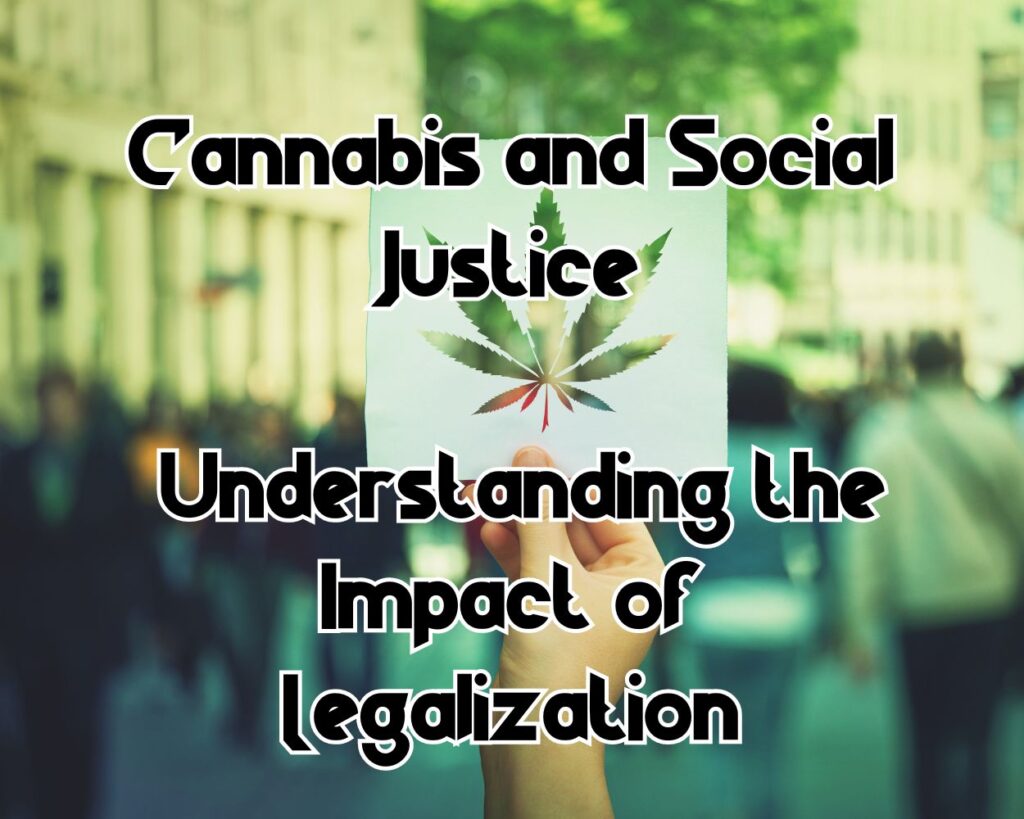The journey towards cannabis legalization in the United States is not just a matter of changing laws; it’s deeply intertwined with social justice. For decades, communities disproportionately affected by the War on Drugs have faced challenges that extend far beyond legal restrictions. As we move towards a future where cannabis is increasingly accepted, it’s crucial to understand the broader implications of this shift, particularly for those communities most impacted.
The War on Drugs and Its Aftermath
The War on Drugs, initiated in the 1970s, led to a dramatic increase in incarcerations, disproportionately affecting minority communities. This policy not only impacted those arrested but also had long-term effects on their families and communities. The legalization of cannabis is a step towards rectifying these injustices, but the path to healing is complex and requires a multifaceted approach.

The Role of Education and Advocacy
Understanding the historical and legal context of cannabis is crucial in addressing the injustices caused by its prohibition. The book “Reforming Criminal Justice: A Christian Proposal” delves into the broader aspects of criminal justice reform from a unique perspective, offering insights that are particularly relevant in the context of cannabis legalization. This comprehensive resource sheds light on the need for a justice system that is fair, rehabilitative, and reflective of Christian values of forgiveness and redemption.
Legalization and Community Empowerment
Legalization opens up opportunities for economic empowerment in affected communities. It’s not just about decriminalizing use but also about creating avenues for legal participation in the cannabis industry. This includes providing resources and support for those who wish to enter the cannabis market, ensuring equitable access to licenses, and offering education on cultivation and business practices.
The Importance of Clear Legal Understanding
As laws around cannabis continue to evolve, it’s vital for individuals and communities to stay informed about their rights and the legal landscape. The website LegalKnowItAll.com offers an accessible platform for understanding laws in simple terms. This resource can be particularly valuable for those navigating the complexities of cannabis laws, ensuring that legal information is not just available but also understandable.
Moving Forward: Advocacy and Action
The path towards true justice in the context of cannabis is ongoing. It involves continued advocacy, education, and policy reform. Supporting organizations and initiatives that work towards these goals is crucial. It’s about creating a future where the benefits of legalization are shared equitably, and the mistakes of the past are not repeated.
The legalization of cannabis is more than a legal shift; it’s a step towards rectifying historical injustices. By educating ourselves, advocating for fair policies, and supporting affected communities, we can contribute to a more just and equitable society. Resources like “Reforming Criminal Justice: A Christian Proposal” and LegalKnowItAll.com play a vital role in this journey, offering the knowledge and understanding necessary to drive meaningful change.
What Impact Has the War on Drugs Had on Minority Communities?
Answer:
The War on Drugs has disproportionately impacted minority communities, particularly African American and Hispanic populations. This policy led to high rates of arrests and incarcerations for drug-related offenses, often for non-violent crimes. The long-term effects include disrupted family structures, economic hardship, and reduced access to employment and housing opportunities for those with criminal records.
How Can Legalization Help Address These Injustices?
Answer:
Legalization can help address these injustices by eliminating the criminal penalties associated with cannabis, which disproportionately affected minority communities. It also opens the door for economic opportunities within these communities through legal cannabis markets. Additionally, some states are using cannabis tax revenues to fund social programs and provide grants to communities most affected by the War on Drugs.
What Are Some Challenges Faced in Achieving Equity in the Cannabis Industry?
Answer:
Challenges include ensuring equal access to licenses and business opportunities in the cannabis industry. Historically, minorities have faced barriers such as lack of capital, stringent regulatory requirements, and limited access to banking services. Addressing these challenges is crucial for achieving equity in the industry.
How Important is Education in Shaping the Future of Cannabis Legalization?
Answer:
Education is vital in shaping the future of cannabis legalization. It’s essential for changing public perception, informing policy, and helping individuals understand their rights and the legal landscape. Resources like LegalKnowItAll.com play a significant role in making complex legal information more accessible to the general public.
Can Restorative Justice Play a Role in Cannabis Legalization?
Answer:
Yes, restorative justice can play a significant role in cannabis legalization. This approach focuses on repairing the harm caused by criminalization. Measures like expunging past cannabis convictions and providing support for reintegration into society are examples of restorative justice in action.
How Can Individuals Support Social Justice in the Cannabis Industry?
Answer:
Individuals can support social justice in the cannabis industry by advocating for fair policies, supporting minority-owned cannabis businesses, and educating themselves and others about the issues. Purchasing from businesses that reinvest in communities affected by the War on Drugs and supporting organizations working towards policy reform are practical ways to contribute.
What Role Does Policy Reform Play in Addressing Past Injustices?
Answer:
Policy reform is crucial in addressing past injustices. This includes not only changing laws around cannabis use and possession but also implementing policies that provide economic opportunities and social support for those disproportionately affected by previous laws. It’s about creating a legal framework that supports equity, justice, and community rebuilding.
As an Amazon Associate we earn from qualifying purchases through some links in our articles.




